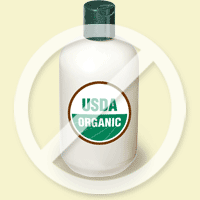No more organic labels for bodycare
This article was originally published in August 2005

Adapted from the Associated Press
(August 2005) — If you want a body lotion, soap or toothpaste that meets organic standards, you’ll have to start figuring it out from fine print in the ingredient list. The U.S. Department of Agriculture says it’s not going to allow the USDA organic seal to appear on bodycare products and cosmetics.
When the USDA created the round “USDA Organic” seal in 2002, the main purpose was to identify foods grown without synthetic pesticides, hormones, sewage sludge and genetic engineering. USDA also said that if bodycare and cosmetic products met the standards for organic food, they too could be eligible for organic certification. The door was open to certify pet food, dietary supplements, clothing and fish, as well.
Now the USDA is changing its policy. It has started notifying cosmetic and bodycare companies that their products can’t be certified organic anymore. Whether dietary supplements can show the organic seal is being discussed. Fish and pet food are off the table for now, pending review.
The Organic Consumers Association (OCA) is asking the USDA to reconsider the policy reversal, saying it hurts small companies that benefit from the organic seal. Bigger companies can’t source the volume of organic ingredients needed to make their products. Besides, manufacturers of bodycare and cosmetic products use the same ingredients used by organic food producers.
OCA’s executive director, Ronnie Cummins, says, “Certified organic olive oil does not magically become non-organic if used as a massage oil instead of on a salad.”
Dr. Bronner’s Magic Soaps is suing the USDA over the time and money spent to put the seal on its products. Bronner’s says it spent $100,000 before a USDA agent certified the seal was allowed on Bronner’s labels.
A USDA spokesman says the department won’t change its decision again without an act of Congress.
